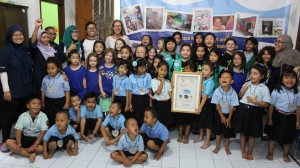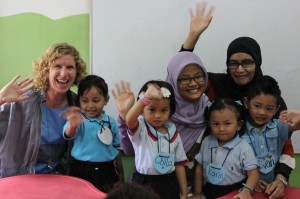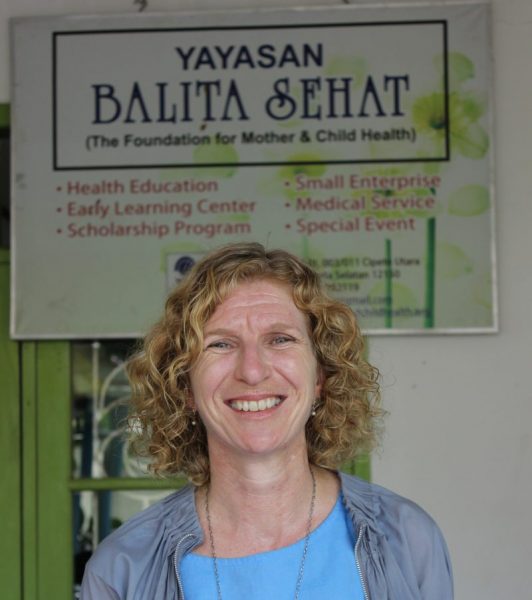Non-Executive Chair, Foundation for Mother and Child Health Indonesia
Lou Simpson’s journey spans marketing and communications for theatres in London, studying and working for NGOs in Cairo, and now, a passion for helping Indonesia’s mothers and children. She shares her story with us and passes on some experienced, expat wisdom.
Lou, you’ve worked for theatres in London, NGOs in Egypt, and obtained a Masters in Global Development. Phew! How did all this lead you to a non-profit in Indonesia?
My background is marketing and communications, working for Sadlers’s Wells Theatre and the Barbican Centre as well as non-profits in London. Working somewhere where the objective is not profit has always appealed. Somewhere in between jobs I backpacked around Java, Bali and Lombok. After 9/11 I no longer wanted to do long-distance with my partner, so I moved to Cairo. Hating the ‘housewife’ label, I resolved to study a Masters and put it to good use, eventually working in communications for non-profits there. We left during the Arab Spring – it wasn’t frightening; only surreal telling my mother on the telephone that the bombs were just fireworks.
We chose Indonesia because of my travels – plus my brother had lived in Sulawesi. Looking for a way to use my Masters, I contacted the Foundation for Mother and Child Health (FMCH) offering to re-do their website. Things evolved from there: over three years later, here I am!
What does FMCH do, and what is your role there?
FMCH began in 2001 when expat women in Jakarta reacted to the shocking figures of child malnourishment (one in three!) in Indonesia, opening a centre for women and children. Today we focus on health, nutrition, education and skills-building via projects like ‘The First 1,000 Days’, supporting women from conception through to weaning. FMCH originated in mainly urban areas, but now is in peri-urban areas like Bojong Gede in Bogor. We’re also in West Timor since 2007, where malnutrition in rural areas is problematic.
My role involves communications, fundraising, and strategy for the development of the organisation. There is a team of about thirty medical and education specialists. In our Skills team there are women we helped as part of our programmes.
There are many causes worthy of time, attention and donations in Indonesia today. How would you advise expats to choose where to put their resources?
Think about the issues that you are most concerned with – as a mother it was the plight of women and children in Indonesia that piqued my interest in FMCH. Find as much information as you can about the work an organisation does and how they do it. Drop in if you can or attend their events. Finally, go with your instincts – you must trust your donation will be well used.
What is a key initiative of FMCH’s that you believe will make a real difference?
Continuing our health education programme, and starting to work more with pregnant mothers – especially to raise awareness of breastfeeding, which, according to UNICEF, is done exclusively by only a third of mothers in Indonesia in the first six months. We want to work with a number of factories to provide a place for mothers to breastfeed or express after returning to work.
Who are you donors? Is it hard to get them, and how do you do it?
Sixty percent of donors are corporations, thirty percent are individuals (mostly expats) and ten percent of our revenue comes from the products handmade by the women we help in our programmes. Individual donors here are similar to those I was used to in the UK – except there, they’re easier to get to via direct marketing, etc. We’re working on building that here. Otherwise, working with local corporates as part of their CSR programmes is successful – we are about to launch a big campaign this year with one.
In 2005, expat women involved in FMCH collected their knowledge and published a guide, today known as Family Guide to Jakarta (www.familyguidetojakarta.com), with revenues going to FMCH. This is another way we raise funds.
Tell us about a particularly inspiring experience you’ve had with FMCH?
I visited a rubbish collectors’ community in South Jakarta with our medical team doing check-ups. I’d been to one in Cairo before but not here. I was expecting squalor, dirt and sadness. We arrived to a large group of smiling kids, then went inside a house made of corrugated iron and bits of wood. We expats live in these palaces, but I was amazed at how clean and organised everything was. The community was set up like a high street with shops and cafe areas. I expected the people to have little or no education but most spoke a bit of English. There was equality—no head honcho calling the shots—so all the workers got the same, fair price for their goods.
It would’ve been easy to think of these people as beyond hope, but they were normal people in a situation not necessarily of their making, making the best of it. And if FMCH can help a little bit with that? Good.
What do you do in your free time?
I think Indonesia is one of the most beautiful countries in the world. We’ve seen orangutans in Sumatra and Kalimantan, been diving in Raja Ampat, and met the Dani people in Papua. In Jakarta it is more about finding interesting places – not the malls! I like Pasar Santa; it shows Indonesians’ creativity. I love Kota but get sad thinking how much more could be done with it.
What recommendations do you have for expats?
With Family Guide, we are putting together a new mini-guide for both the pre-move and the settling down stages. Until then, I say get involved in some cultural association – the Indonesian Heritage Society is a good place to start. Fortunately, there is a lot of choice, whether you like singing or volunteering or being involved at school – it doesn’t matter what you choose, just do something to build a network and a routine. Finally, see it as an opportunity to reinvent yourself – like I did!
Thank you Lou. For more information please visit www.fmch-indonesia.org. To get involved, subscribe to the newsletter via the website, email [email protected], or attend any FMCH event – donations are always welcome.
FMCH will be holding a Pancake Festival in March and April together with Nanny Pavillon. There will be fun challenges like eating, flipping and running with pancakes! For more info, see our Events page.




